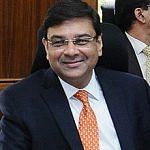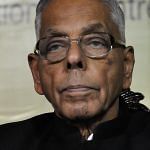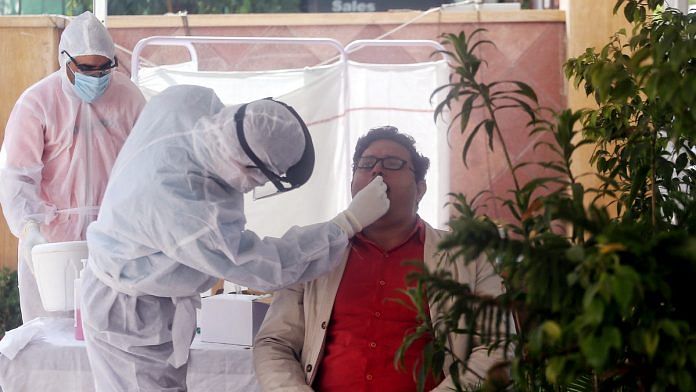Can’t avoid ubiquitous testing
 Amartya Lahiri | Royal Bank Professor of Economics at the University of British Columbia
Amartya Lahiri | Royal Bank Professor of Economics at the University of British Columbia
 Urjit R Patel | Former governor, Reserve Bank of India
Urjit R Patel | Former governor, Reserve Bank of India
The Indian Express
Stating that “ubiquitous testing” is essential to get the economy going again and resume normalcy, Lahiri and Patel argue that “if Indian businesses can respond to the challenge by quickly building capacity to produce relatively cheap testing kits, this could spark a boom in the biomedical industry”. With no vaccine or treatment available for the next year at least, testing people on a regular basis is a must. As private players enter the market, testing prices are likely to reduce but it will also give a much needed boost to the economy. They end by noting that “meeting the challenge could be a perfect launchpad for a global Make in India offering”.

Ram Madhav | National general secretary, BJP
The Indian Express
Promising domicile and employment with the scrapping of Article 370 and 25(A) in Jammu and Kashmir, Madhav argues that harsh measures in the region “can now be done away with, as the state administration and security apparatus are capable of handling difficult situations”. With a drop in militant recruitment, and claiming a sense of calm from the region’s residents, Madhav goes on to say that “J&K is fully and integrally India’s and the only dispute to settle is the return of PoK”.
China, better prepared for the post-COVID world

M.K. Narayan | Former national security adviser and a former governor of West Bengal
The Hindu
Narayan looks at and India and China and argues that “there are good reasons why the pandemic is unlikely to end Beijing’s ambitious power outreach, a point India must note”. Criticising the Rs 20 lakh crore economic package, Narayan calls it a “patchwork of stimulus packages (which) reveals a disjointed mosaic of ideas and thoughts”. While India and China are both predicted to face an economic setback, they are also the two countries to have a positive growth, according to the International Monetary Fund. While discussions of companies demitting China may abound, it is not necessary they will turn to India. Narayan also says it is important to note that “China has, for years, adopted a policy of gaining a strategic advantage not only in military matters but also in economic and technical areas”.
Covid-19: The science behind India’s trajectory

N.K. Mehra | ICMR emeritus scientist and former dean of the All India Institute of Medical Sciences, New Delhi
Hindustan Times
India has witnessed a more widespread infection and the lockdown has not yet had its desired effect. While China, US and European countries began seeing a flattening curve, India is yet to record such a trend. Mehra argues, “The predominantly asymptomatic course of the disease and limited number of critical cases merit more scrutiny”. With all eyes on the World Health Organization-sponsored solidarity “trial that tests four different lines of treatment regimens to save lives in the short-term”, Mehra goes on to say, “science alone can motivate tomorrow’s healthcare providers to rise to their fullest potential and deliver life-saving devices to prevent and treat this and future viral pandemics”.
Let’s not slide back to Licence Raj, we must not stifle the economy

Naushad Forbes | Co-chairman Forbes Marshall
Business Standard
The author argues that unnecessary bureaucratic processes are slowing down operations after 60 per cent of the firms opened earlier this month. Check posts at every border, passes for every person included in operations and transportation etc., are causing delay, wastage of time and unnecessary cost, he says. With the example of ‘Stanford Prison Experiment’, the author explains that if officials are given the power to intervene and control, they will do so while “the net effect would be an economy tied up in knots”.
Lessons from online retail data on our food supply chains

Kanika Mahajan | Assistant professor of economics at Ashoka University

Shekhar Tomar | Assistant professor of economics at Indian School of Business
Mint
The authors explain the economic impact of the lockdown on food supply chains using online retail data. They conclude that in-stock products fell by around 10 per cent for fruits and vegetables while the prices were not affected as such. The data also reveals that prices of products with closer production units to the market were not affected. The authors also say that the disrupted chains have somewhat recovered after the first edition of the lockdown but the supply chains “continue to be disrupted in the case of perishables”. According to the authors, this can lead to great losses for farmers as well as consumers. The farmers growing perishable products might need immediate support from the government so that their products could be delivered on time.

Sajjid Z Chinoy | Chief India Economist, JP Morgan
The Financial Express
The author talks about the debate on what should be the appropriate fiscal response to Covid-19. He notes that the subsequent trajectory of debt/GDP depends on medium growth, which then impacts future growth. India’s fiscal response in the future will depend on potential growth, he writes. He also states that it is important to “jumpstart risk-averse financial sector into funding an economic recovery”. Chinoy concludes that altering the growth potential would not be possible without “crucial investment in health and education”.

Mohan R Lavi | Chartered accountant
The Hindu Business Line
The slew of measures announced by Finance Minister Nirmala Sitharaman will help change the definition of MSME businesses. But one of the issues is that it “amounts to the government borrowing from the banks on behalf of the MSME entrepreneur and later repaying the banks”, which runs the risk of becoming NPAs (non-performing assets). The author suggests providing a “GST loan” to the MSMEs, the payback duration of which would depend on how long Covid-19 lasts. Providing this loan would give MSMEs an opportunity to conserve cash for the next few years.



